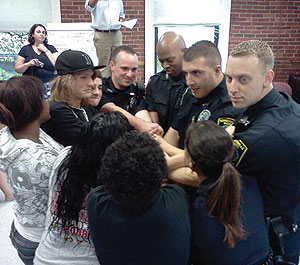
Teens and cops find common ground by establishing open, trusting, and honest dialogue between them.
Thirteen Somerville youth and eleven new police officers gathered at the Somerville Youth Center on August 16 with the goal of breaking down the stereotypes each group has of the other and looking for ways to work together to increase community safety. The dialogue was a part of the final stages of training for the new officers, fresh from the Police Academy.
“We always talk about community policing in the abstract,” said Somerville Police Chief Thomas Pasquarello. “This is a great first step for new officers to experience working in the community.”
The afternoon included an opening conversation with Mayor Joseph Curtatone, Chief Pasquarello, Deputy Chief Michael Cabral, and some veteran officers. Next, youth and police participated in a series of interactive exercises, one-on-one conversations, and small group conversations aimed and generating concrete ways to facilitate better youth/police relations led by Teen Empowerment staff. Participants talked openly about violence, peer pressure, and the way each group views the other’s motives and attitudes. The dialogue allowed Somerville teens and police, who often find themselves at odds with one another, to find some common ground.
“They definitely changed my perspective on what cops are like,” said Teen Empowerment Youth Organizer Iliana Rivera. “Hopefully, other youth can share my experience and feel the same.”

- Photos courtesy of The Center for Teen Empowerment.
This is the first of two dialogue sessions between youth and new officers being added to Somerville’s police force this year. The next dialogue scheduled for the fall will include different officers and youth in an effort to bring the experience to as many as possible. According to Teen Empowerment Somerville Director Marlon Ramdehal, many of these youth are overcoming generations of anti-police feeling. At the same time, police are trained to not take simple interactions on the street at face value, which can lead to misunderstandings.
“The key to the success of these dialogues is our careful attention to building relationships, which leads to honest dialogue and a process jointly owned by police and youth,” said Ramdehal. “The process humanizes both the youth and the officers and helps them to understand that their actions and attitudes toward one another on the street can influence their peers and fundamentally change the nature of police-youth relationships in the city.”
Founded in 1992, The Center for Teen Empowerment, Inc. empowers youth and adults as agents of positive individual, institutional, and social change. Each year, youth conduct over 150 initiatives involving some 6,000 people. The dialogue sessions are funded in part by the state’s Charles E. Shannon Public Safety Initiative grant.
Another, similar session will be held in November when the next groups of new officers graduates from the Police Academy.












Reader Comments